LA Game Space Round-Up: Part 1
By Mento 0 Comments
Hello friends. A little while ago, I decided to put some money towards the LA Game Space Kickstarter. The goal of the project was to set up a location in downtown LA where game designers could work, talk and present ideas to each other. I think there's going to be exhibitions and the like later on as well. The thing I was interested in, however, was a batch of preliminary games that would either be made there or created as part of the exhibition from outside the space.
Honestly, the specifics didn't intrigue me too much considering I'm like 5000 miles from the city of angels, but the Experimental Games package for backers seemed a bit too good to pass up. Especially since it included a game from Katamari Damacy and Noby Noby Boy creator Keita Takahashi and a few other Indies that looked like they might be worth a playthrough. Since the codes came in today, I've been playing a few of them and will be putting up my thoughts (and pictures) in a series of blogs this week. No doubt you'll see a few of these pop up on Patrick's Worth Playing (Worth Jamming? Not sure it applies) as well later on.
I forget when any of these will be made available for non-backers. I imagine they're on it. Hold tight? (Plus, their site has an Instagram link, so I don't think I'm breaking any rules here regarding images. At least I hope not. I didn't see any NDAs, dagnabbit.)
Alphabet
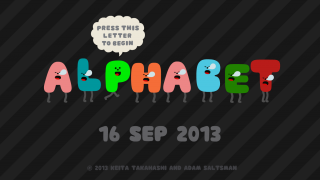
Alphabet is the aforementioned Keita Takahashi joint, which he co-created with Adam Saltsman.
As one might suspect from the creator of Noby Noby Boy, we have a novel concept surrounded by a whole mess of cute whimsy and not really much in the way of an actual game at the core of it all. Alphabet certainly has more of a focus than the omnivorous caterpillar wonder that is Noby Noby Boy at the very least.
The game requires that you play as several Sesame Street-esque letter people simultaneously, moving the whole crowd through a series of obstacle courses with a few recurring roadblocks. The difficulty comes in having more of these little ecstatic letter people to herd around with each new stage, with each only corresponding to their appropriate key on the keyboard. Once their letter is clicked, the letter jumps into action, hopping a small distance unless several clicks are made at once. Early on, it's easy to keep four or five fingers over the appropriate keys and tap them to keep the momentum going all the way to the finish line. When you have around 20 of the lil' dudes, the game changes quite a bit.
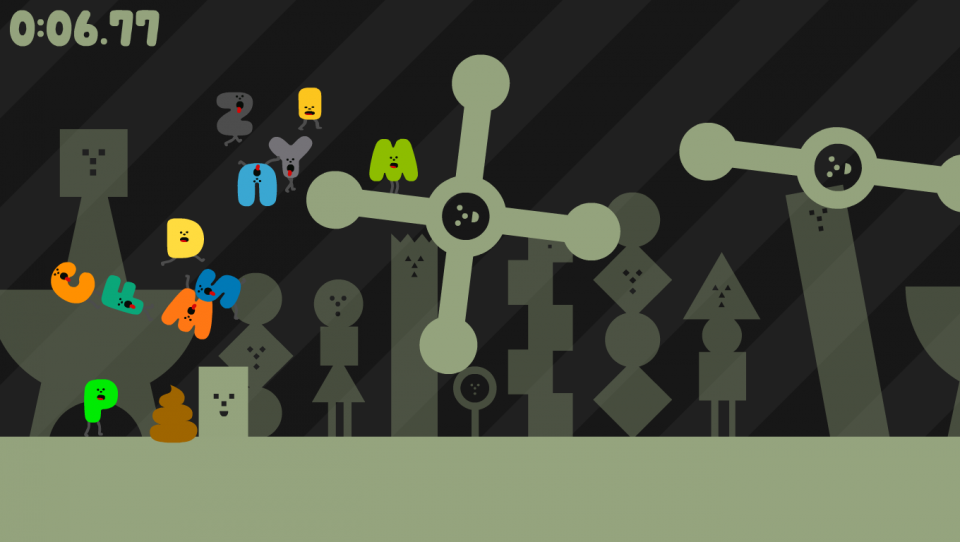
At this point you're relying on fruits found across the obstacle course, most of which are easily attainable. Any letter person who eats a fruit temporarily turns all his fellow letter people into clones of himself - this means the player simply has to tap the one button to keep everyone moving. Should they reach the next fruit before the letter person has processed the previous one (which leaves a big ol' comedy poop behind), you can keep this chain going all the way to the end. In theory. Failing to keep the chain going means tapping whichever letters are lagging in a very slow procession to the goal.
It's a pretty cool idea and an absolutely adorable game - all the characters and most of the background have Takahashi's trademark facial expressions, and the music is simply a kid and what I hope is her parent going through the Alphabet Song in a weirdly catchy remix - but after ten "races" it's over a little too quickly. Still, it is a promising start to this collection.
Control
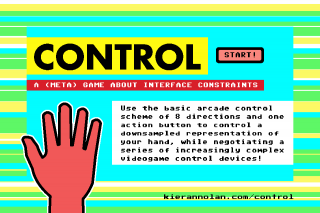
Control's both an intriguing exercise in meta-gaming and one of the least pleasant gaming experiences I've had certainly with this package of games, if not this year. These two aspects might not necessarily be unrelated.
The goal of Control is, as its title screen explains, to use a virtual hand to hit buttons on virtual controllers. The game goes forward through time, prompting the player to get their digital digits around controllers from the Atari 2600, the Sega Mark II (the precursor to the Master System), the NES and beyond. In truth, I only got as far as the NES before deciding to quit while I was ahead.
The other thing you need to know about Control is that the presentation is that of a Commodore 64 front-end, with all the screechy loading noises and flashing color bars that the handful of thirtysomethings on this site might recall fondly. I personally can't say I miss that electronic caterwauling, though, and the volume's right up to boot. I suspect this ties into the meta element - the game isn't so much honoring the evolution of video game control schemes than it is castigating it, demonstrating how difficult and confusing modern game controls have become for the simple layman to understand. Manipulating these controls without making errors (which is where the extremely loud noises come in, which sound like robotic cats getting mauled by cyberbears) and within the time limit gets harder and harder, because the player is also struggling with the game's "hold two directions and space bar" type controls to get their fingers in the right place.
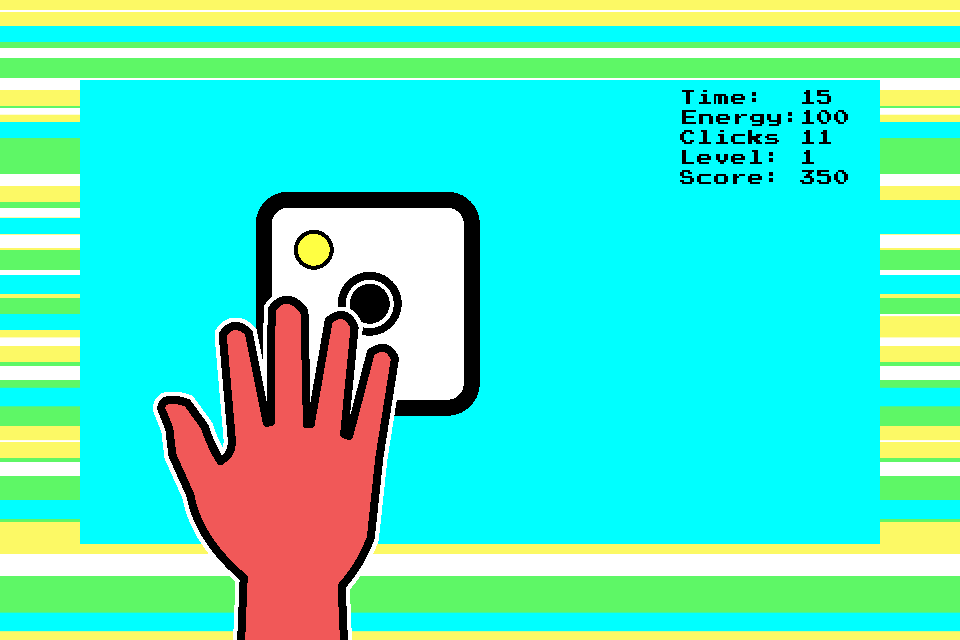
The game certainly does what it sets out to do, if that's only instilling the player with a newfound unease and discomfort with gamepads that they have long since become acclimatized to. As an actual game one might play for fun and enjoy its sounds and visuals, it falls somewhat flat. But then that's probably the idea.
Coureur des Bois
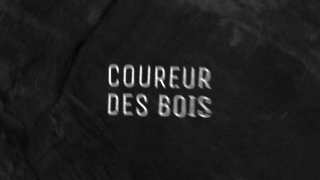
My first impression when playing Coureur des Bois ("runner of the woods", referring to old French-Canadian traders) was that it was "kayak QWOP". It's certainly an odd looking game that has a very disorientating style that, for me, evokes something of an adrenalin rush. You feel like you're moving at an incredible pace down this river, when really the ride is far more measured and serene. Serene but for the ravenous mountain lions, that is.
Perhaps one shouldn't expect rationality from Tamas Kemenczy, half of Cardboard Computer. As in, the Kentucky Route Zero guys. If KR0 does anything right (and it does a lot) it's finding a way to make the mundane, surreal and the surreal, unintelligible. The goal of Coureur des Bois is to simply make it to the end of the river in your kayak. There are four buttons for steering: left paddle forwards, left paddle backwards, right paddle forwards and right paddle backwards (hence the QWOP impression) and the player can also zoom out a bit to see where the river is going. The difficulty is in not letting yourself get too close to the river's edge, as mountain lions prowl in wait on either side and will leap in to kill you if you linger too long near the bank.
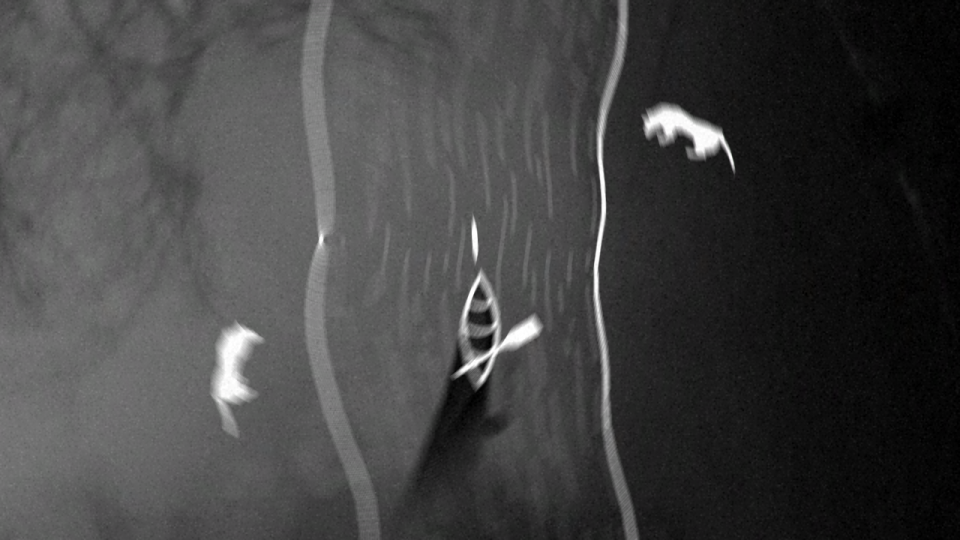
Coureur des Bois apparently has an ending, but I could never get the hang of the controls long enough to not steer myself into an embankment and be summarily devoured by a large feline. It's definitely possible - I passed at least one checkpoint, as sparse as they are - but the whole game feels like it's trying to fluster and confuse you with its zippy black and white visuals, discordant tunes and awkward controls. It's a really fascinating game to look at and play, though. Maybe I'll try again when I'm feeling braver, like the French-Canadian outdoorsmen for which it is named.
Depth
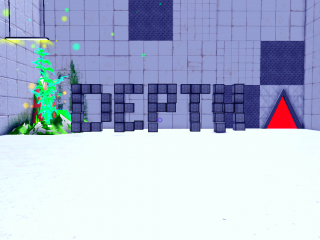
Depth's probably my favorite of these first six games, in honesty, but it's not a particularly novel game in many respects. A first-person puzzle game in which you run around various white-tiled rooms, attempting to find the exit by manipulating the game's central puzzle-solving mechanic while avoiding lasers and other obstacles. It's probably hugely reductive to pull the old "was I talking about this game or a certain other game?" introductory screed, but it's clear that Depth wears its Portal aspirations on its sleeve. It's a bit more low-key than Valve's vintage vortex vaulter and that aforementioned central puzzle-solving mechanic is kind of a doozy too.
In Depth, the goal is invariably finding the exit to each of its 15 puzzle chambers. To do so, certain colorful objects (blue and orange, sure, but let's be nice) can be placed elsewhere in the world by standing near them and hitting the action button while the camera is focused on them. Depending on your perspective, the object transforms into a much larger object some distance away, in a sense being projected outwards from where you're standing. I've given you a visual aid to help explain:

As I hope is made apparent here, the blue cube is quite tiny until you look at it up close. Once shooting the box, it becomes a fixture in the far wall and a lot bigger besides. It's also, importantly, now a bridge between the block with the ladder and the blocks on the right. Much of the game's puzzles are based on getting the right angle on a blue box and sending its enlarged form back into the far end of the room to wherever it is needed.
It's a great idea, one that was also tinkered with in the thematically similar Perspective, and the game's actually quite substantial to boot. Maybe not in a retail game sense, but definitely in the "$10 off Steam" downloadable sense. It's perhaps not there yet since it lacks any kind of narrative and the visuals could be polished a bit more, but I could easily see this being the next Magrunner, QUBE or Antichamber.
Electronic "Sweet 'n Fun" Fortune Teller
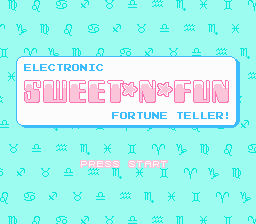
I really don't know what to make of this "game". The intent was clear: to recreate one of the many superfluous fortune-telling games that were briefly popular on the Famicom, i.e. the Japanese NES. I know this because I've added a fair few of them to our wiki myself, despite never feeling quite sure if a fortune-telling simulator belongs on a video game wiki. Eh, I'm sure history will exonerate my adding pseudoscience utilities to a video game website somewhere down the road.
Anyway, all the game can do is extrapolate (or guess, let's be serious here) your fortune and your compatibility with another person in a couple of modes that require your full name (though, in a twist hilariously germane to the 8-bit format, the text input can only accept so many letters), date of birth and blood type to get started. The blood type especially is a nice touch, since there's much that can be said about one's personality from their blood type according to many Japanese magazines. Also a nice touch? That this is a bona fide NES rom, which requires an emulator (or, one can only presume, the real thing) to run it.

With similar tools such as Chuugoku Senseijutsu, '89 Dennou Kyuusei Uranai and Rare's own inexplicable entry Taboo: The Sixth Sense all being real things that exist, Electronic Fortune Teller isn't so much a bizarre non-sequitur than a very specific callback to a specific sub-genre that is an amusing in-joke to some and a complete enigma to most others. But hey, maybe I'd buy something like this if it told me how well I was going to do on SaltyBet. I'd take anything at this point.
Game Space Space Game
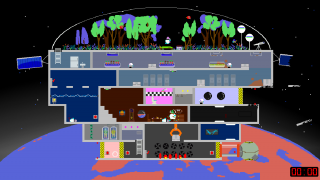
The Game Space Space Game is a single-screen space game in which the player must escape a damaged research station as quickly as possible. To do so, you have to pass through the entirety of the station and overcome its many automatic defenses, hostile enemies and environmental hazards along the way.
When anyone talks about "masocore" games, they tend to just focus on monstrously difficult platformers like Pid or Super Meat Boy or Cloudberry Kingdom. Like "jump the shark" it's become an expression so ubiquitous that its original meaning has been diluted in the process, with later examples not quite exemplifying that initial specific definition.
The original masocore platformers, like I Wanna Be The Guy and the many Mario romhacks that exist (like Kaizo Mario), have another unifying aspect beyond their difficulty: Their love of screwing over the player by throwing a cheap death at them they had absolutely no way of knowing about. This is where the masochism comes in: You fume, you exasperate, but then you jump back in. "I know about that trap now," you think, "I can beat this asshole game." And then you immediately fall for the next pitfall just beyond it. Sometimes it even takes a few incredulous deaths to figure out the solution. Each time, you're sent just far enough back to make it frustrating, but you persevere anyway through gritted teeth. That's what it means to be a masocore game.

Game Space Space Game absolutely embodies the masocore philosophy. In almost every single room above something bad might happen to you if you aren't prepared for it. Sometimes the danger is obvious, but has some element to it you couldn't anticipate (here's a freebie: those little grey robots on the second floor from top move really fast when they see you), but oftentimes the hazard isn't made clear until you've just been killed by it. And guess what? You start off on that little bed in the Silent Running-esque hydroponics dome each time. I don't want to say anything more about any particular part of this game, since it's incredibly short (well, if you don't count all the deaths) and quite imaginative. Let's just say I'm looking forward to Patrick trying it out on one of his "Worth Playing"s. It'll be Cat Mario all over again.
Anyway, that's the first six games. I'll come back a little later with another sextet sometime soon, as I keep playing through them. I couldn't say if I've quite recouped my investment yet (but hey, I did it for the shorties), but I've seen and played a lot of games that, if they weren't necessarily fun, were at least interesting. Stay tuned for Parts 2 and onwards and... thanks for stopping by?
| Part 1 - Alphabet, Control, Coureur de Bois, Depth, ESNF Fortune Teller, Game Space Space Game. |
| Part 2 - Guilded Youth, Inputting, LA Death Disk |
| Part 3 - Micomonocon, A Moth in Relay, Pachalafaka, Perfect Stride, Poocuzi, spiralsky. |
| Part 4 - Sunshine, To My Favourite Sinner, uu, VideoHeroeS, Irrational Exuberance. |
